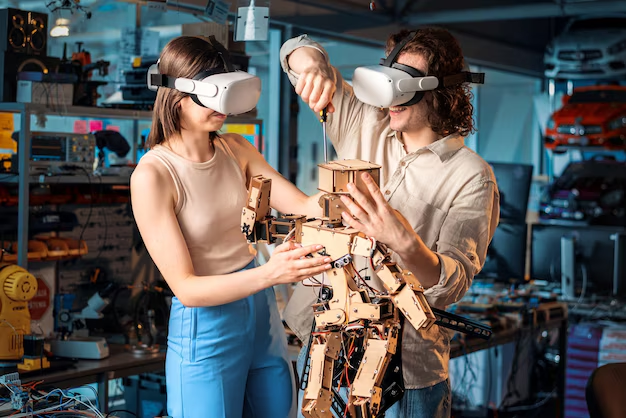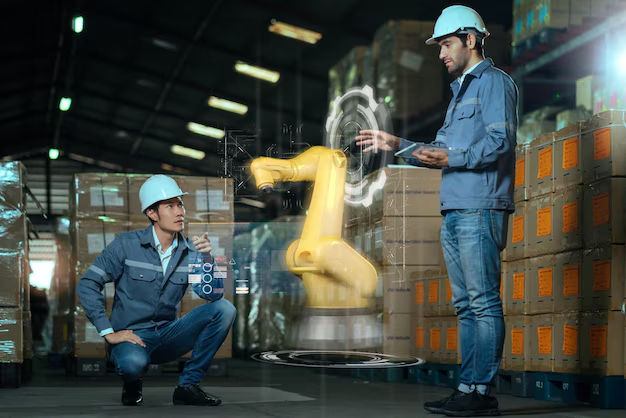In the modern era, robotics is transforming the way industries operate, revolutionizing manufacturing, healthcare, logistics, and more. By integrating artificial intelligence (AI) and automation, robots are not only increasing productivity but also offering new possibilities for Potential Of Robotics efficiency, precision, and safety. Innovating industries with robotics is becoming an essential step for businesses aiming to stay competitive in today’s fast-paced environment. In this article, we will explore how robotic technologies are reshaping industries and unlocking their immense potential for the future.
1. The Rise of Robotics in Modern Industries
Robotics has evolved from its early industrial applications to becoming a central force in various sectors. By automating repetitive tasks, improving safety standards, and optimizing production processes, robotics is enabling industries to thrive in a rapidly changing technological landscape.
The Evolution of Robotics:
- Early Automation: Early robots were confined to simple, repetitive tasks in industries such as automobile manufacturing. Over time, they’ve evolved with the integration of artificial intelligence and machine learning.
- AI-Powered Machines: Modern robots leverage AI to perform more complex, decision-based tasks, enabling them to adapt to changing environments and conditions.
- Autonomous Systems: Autonomous robots, including self-driving vehicles and drones, are now increasingly common in sectors like transportation, healthcare, and delivery services.
2. How Robotics is Innovating Key Industries
Robotics is bringing revolutionary changes to several key industries, enhancing productivity, improving safety, and pushing the boundaries of what was once thought possible.
Manufacturing Industry:
The manufacturing industry has always been a major adopter of robotics. Industrial robots are streamlining production lines and ensuring that goods are manufactured with precision and efficiency.
- Robotic Arms: These are used for assembly, welding, painting, and packaging, offering unparalleled speed and accuracy.
- Robotic Automation: With robotic automation, manufacturers can achieve continuous production, reduce labor costs, and improve consistency in products.
- Flexible Manufacturing Systems: Modern robots can be reprogrammed quickly, making them ideal for smaller batch production and flexible manufacturing.
Healthcare Industry:
Robots in healthcare are improving patient outcomes by enabling faster and more accurate surgeries, enhancing diagnostics, and improving patient care.
- Surgical Robots: Robots like the da Vinci Surgical System allow surgeons to perform minimally invasive procedures with higher precision, resulting in less patient recovery time.
- Robotic Prosthetics: Advanced robotic prosthetics offer patients a higher level of control and functionality, improving mobility and the quality of life.
- Robotic Assistance: Assistive robots help elderly and disabled individuals with daily activities, offering greater independence and improved well-being.
Logistics and Supply Chain:
The logistics and supply chain industries are undergoing a transformation thanks to the use of robotics, with companies turning to robots to streamline storage, inventory management, and last-mile delivery.
- Automated Warehouses: Robots equipped with AI can move inventory, stock shelves, and perform order picking more efficiently than human workers.
- Drones and Autonomous Vehicles: Autonomous delivery robots and drones are quickly becoming an integral part of last-mile delivery solutions, reducing transportation costs and speeding up delivery times.
Agriculture Industry:
Robotics is revolutionizing agriculture by optimizing farming techniques, improving crop yield, and reducing labor costs.
- Automated Harvesters: Harvesting robots are capable of picking fruits and vegetables efficiently, minimizing waste and reducing the need for seasonal labor.
- Robotic Planting Systems: Robots equipped with sensors and AI can plant seeds with precision, ensuring optimal plant growth.
3. Robotics in Everyday Life: Enhancing Convenience and Quality of Life

In addition to industry-specific applications, robotics is also transforming our daily lives. From cleaning our homes to providing companionship, robots are making life easier and more enjoyable.
Smart Homes and Household Robotics:
- Robot Vacuums: Robots like Roomba are automating household chores, allowing people to spend their time on other activities.
- Personal Assistants: Robots are now part of the home environment, helping with tasks like cooking, cleaning, and organizing.
Robots in Education:
- Learning Tools: Robots are increasingly being used in schools to enhance the learning experience by offering interactive lessons, providing personalized tutoring, and engaging students with STEM education.
- Robotics Competitions: Platforms like FIRST Robotics are inspiring young minds to pursue careers in technology and engineering.
4. The Role of AI in Enhancing Robotics Capabilities
Artificial Intelligence is the backbone of many advanced robotics systems, enabling them to learn, adapt, and make decisions based on their environment. By integrating machine learning with robotic systems, we can achieve high levels of autonomy and intelligence.
- Autonomous Operations: Robots equipped with AI can perform complex tasks without human intervention, from medical diagnoses to logistics management.
- Predictive Maintenance: AI-driven robots can detect wear and tear in machinery and predict when maintenance is needed, preventing costly breakdowns and ensuring optimal performance.
5. The Future of Robotics: Boundless Potential Ahead
The future of robotics is filled with boundless possibilities. As technology continues to advance, robots will become even more integrated into everyday life, revolutionizing industries and offering new opportunities for growth.
- Human-Robot Collaboration: The future will likely see increased collaboration between humans and robots, where machines complement human workers, enhancing overall productivity and safety.
- Personalized Robotics: The next generation of robots will be designed to cater to individual needs, whether in healthcare, education, or household tasks.
- Ethical Considerations: As robotics continues to advance, important ethical concerns regarding job displacement, privacy, and human-robot interaction will need to be addressed.
Also Read : Robotics Unleashed: How Machines Are Reshaping Our Future
6. Conclusion: The Power of Robotics in Innovating Industries
The potential of robotics in innovating industries is limitless. From improving efficiency in manufacturing to enhancing the quality of life in healthcare and personal assistance, robots are reshaping the way we live and work. As AI and robotics continue to evolve, we can expect to see even more groundbreaking innovations that will change the future of industries and everyday life.
Businesses that embrace robotic technologies will remain competitive, reduce operational costs, and increase their productivity. The question is not whether robotics will continue to grow but how fast and how impactful this growth will be in reshaping the future of industries worldwide.
SEO Optimized Keywords:
- Robotics technology
- AI in robotics
- Industrial robots
- Robotic automation
- Future of robotics
- Autonomous robots
- Healthcare robots
- Manufacturing robots
- Robotic arms
- Robotic prosthetics
- Logistics robotics
- Robotic vacuum cleaners
- Agriculture robotics
- Robotics in daily life
- Personal robots
- Robotics applications
- Robotics in healthcare
- Autonomous vehicles
- Robot-assisted surgery
- Robotics in education
- Robotics in manufacturing
- Robotic process automation
- Future of AI and robotics
- Collaborative robots
- Robots in smart homes
- Robotics trends
- Robot assistants
- Smart robots
- Robot innovations

